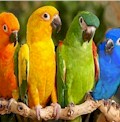Regardless of the fact that many birds can potentially outlive their owners, We need to remember just how fragile birds are when compared to many of the other types of pets we could own. An interesting fact that demonstrates the fragility level of birds is how miners used to actually exploit this weakness in order to insure their safety while underground. They would often bring a canary down into the mines with them since they knew that the birds were extremely sensitive to potential dangers and the canary would die if the air in the tunnel was becoming toxic.
Most pet birds also have this same sensitivity to toxic fumes. Even common every day items such as aerosol sprays, Teflon pans and even household furniture polish can be potentially lethal to most birds. It's highly advisable that when you use anything that has a strong odor or gives off fumes that you do so in a well ventilated area that is a good distance away from where your birds are kept.
Another dangerous hazard for your new pet bird is their natural attraction to chew on objects. Many birds like to bite and chew on items that are welded which may cause them to develop lead poisoning from the soldered joints on the object they were chewing. Birds also enjoy nibbling on potted plants and flowers. Make sure that if you keep any plants close to your birds cage that they are edible or at the very least non toxic. In cases were you are not really sure, it would be best to keep them safe distance away just to be on the safe side. Despite all the stories regarding poinsettia plants being poisonous, in reality they are pretty harmless. Another good idea would be to provide an alternative that is inherently safe, such as a small pot of an herb like parsley which may help your birds avoid the temptation to nibble in the first place.
If you tend to feed your birds different kinds of fresh foods, you are doing a good service for your birds health in most cases. However, it is very important to note that there are indeed some things you should never feed your birds. For example, items like avocado, coffee and chocolate are natural toxins to many birds.
When the holiday season begins to approach, chances are you will want to bring a tree into your home. A common misconception many people have when they bring a tree home is the assumption that their birds can make good use and get enjoyment out of climbing it. In reality many types of Christmas trees are pretty toxic to birds. Many times they have been treated with some form of chemical preservative to help them last longer during the holidays. In addition, many of the ornaments and the electric lights that we traditionally hang on our trees can also pose a safety hazard.
If your bird does not have it's wings clipped, there are additional safety concerns you should prepare for. First, you need to make sure that all of the windows in your home have shades or curtains so that if you let your bird fly around abit you can cover them while your bird is out so he wont just fly through any old opening. If your home also has glass doors, you should cover them as well. If you decide not to use any curtains or shades, in the very least you should attach some form of safety decals on the glass itself so that your bird can tell the glass is there. It is not unheard of to hear stories where a bird has flown into a glass window it could not see and broken it's neck. Any type of mirror or other reflective surfaces pose the same type of problem.
You should also be sure you don't have any kind of standing water that is easily accessible when your bird is out of it's cage. It's very easy for a bird to drown in a toilet or the kitchen sink in just a few seconds. Cooking while allowing your bird to fly around the house is also not the best idea, especially if you have any pots on your stove uncovered.
Lastly, more than one bird owner has over looked the fact that his bird was perched on their shoulder just as he rushed to answer the front door. You should never carry your bird with you to an open door, regardless wither or not their wings are clipped. Even a bird with clipped wings will still be able to glide fairly far if they happen to catch an updraft.
Some of these things may seem highly unlikely to occur but when you love your pet, any potential danger is worth being prepared for.
